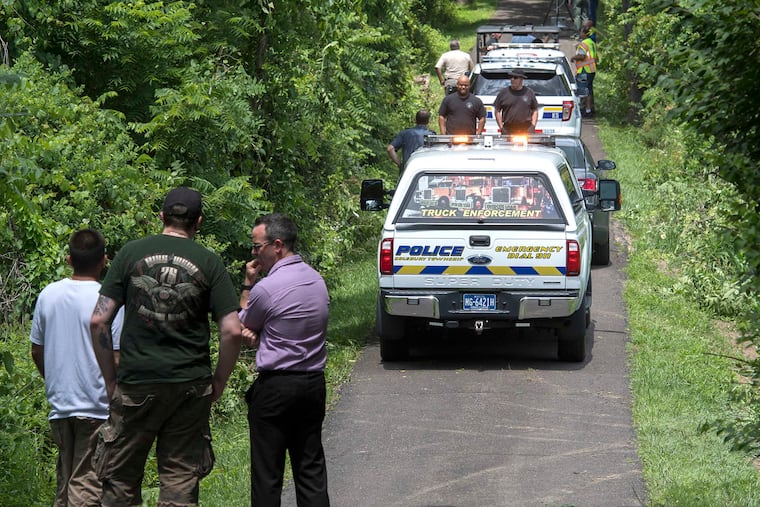Sean Kratz, who helped carry out grisly Bucks County farm slayings, is denied an appeal of his murder conviction
Kratz, convicted of helping his cousin, Cosmo DiNardo, kill four men in Solebury Township in 2017, said his trial lawyer had been ineffective.

A Bucks County Court judge on Wednesday denied an appeal of the murder conviction of Sean Kratz, who helped kill four young men on a remote Solebury Township farm in 2017.
Kratz, 26, had sought a new trial, saying his lawyer, Craig Penglase, was ineffective and had pressured him to accept a plea deal without properly explaining the terms.
“He always made it clear that he wanted me to take a deal, and never to go to trial,” Kratz testified Wednesday. “He was smooth with his words.”
A. Charles Peruto Jr., Kratz’s new lawyer, said Penglase ignored Kratz’s wish to go to trial, and misrepresented the terms of the agreement with prosecutors. As a result, he said, Kratz made a last-minute decision to withdraw his plea and face a jury.
» READ MORE: Sean Kratz guilty of murder in grisly slayings on Bucks County farm, jury says
But Assistant District Attorney Eugene Tsvilik called that suggestion “incredible,” and cast doubt on the assertion that Kratz didn’t understand what he was agreeing to.
“It was reasonable to tell Kratz to take that deal, which would have spared him from the death penalty, and a first-degree murder conviction,” Tsvilik said.
Judge Jeffrey Finley, who presided over Kratz’s trial, denied the appeal later Wednesday afternoon.
Kratz was convicted of first-degree murder in November 2019 in the death of Dean Finocchiaro, 22, after confessing that he shot him in the head at the urging of his cousin, Cosmo DiNardo. Kratz was also convicted of voluntary manslaughter in the deaths of the three other victims: Thomas Meo, 21, Mark Sturgis, 19, and Jimi Patrick, 19.
DiNardo, a Bensalem resident with a history of mental health issues and erratic behavior, lured all four men to a farm his family owned in Solebury Township in July 2017.
There, DiNardo shot Meo, Sturgis and Patrick, and buried them in a makeshift grave. The search for the victims garnered international attention for days, until DiNardo led detectives to the gravesite as part of a plea deal with prosecutors.
Under the terms of that deal, DiNardo pleaded guilty to killing all four men to avoid the death penalty. He is currently serving four consecutive life sentences in state prison.
» READ MORE: Timeline: Cosmo DiNardo's troubled past, and the search for his alleged victims
Kratz initially signed off on a similar deal negotiated by Penglase: an agreement to plead guilty to three of the murders in return for a prison sentence of 59 to 118 years.
But moments before he was set to accept that plea in May 2018, Kratz decided against it, shocking Penglase and the victims’ families. He said Wednesday he did so on the advice of his family.
Kratz was convicted a year later, but spared from the death penalty by prosecutors, who said they did so at the request of the victims’ family.
Peruto appealed Kratz’s conviction to the state Superior Court in April 2021, challenging some of the evidence admitted at trial. It was denied, as was a further appeal to the state Supreme Court on the same issue months later. Wednesday’s appeal, on the grounds of ineffective assistance of counsel, was the latest challenge to the case.
Under questioning from Peruto on Wednesday, Kratz testified that Penglase initially assured him the maximum prison time he would serve under the plea was 59 years. Kratz said he learned only the night before he was set to make that plea that that number represented the minimum sentence.
Kratz also said he agreed to make a recorded confession as part of the plea without realizing that the statement could be used against him if he went to trial. Peruto said the statement became a key piece of evidence for the prosecution..
“The bottom line is that this was ineffective advice of counsel in conveying this plea to him,” Peruto said.
Penglase testified Wednesday that after receiving the offer from prosecutors, he explained it to Kratz in detail and repeatedly asked him if he had any questions about it.
Kratz never seemed confused, he said, and even signed a document that outlined how much time he would spend in prison.
» READ MORE: 'I am a savage': How Cosmo DiNardo's postings show alleged killer unraveling
“After we received the plea, I explained to him that that was the offer, and it was the only offer,” Penglase said. “I reminded him that we had a video confession in the case now, and that by not going forward with the plea, that statement would be used against him.”
In issuing his order denying Kratz’s appeal on Wednesday, the judge did not explain his reasoning.